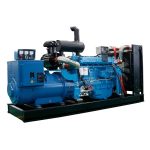Maximizing Efficiency and Reliability Diesel Generators for Parallel Operation with the Grid
Introduction Diesel generators have long been used as a reliable source of backup power in various applications, ranging from hospitals and data centers to industrial facilities and residential buildings. In recent years, the demand for reliable and efficient power supply has led to the development of advanced technologies that allow diesel generators to operate in parallel with the grid. This article explores the benefits, challenges, and considerations of using diesel generators for parallel operation with the grid. Overview of Diesel Generators Diesel generators are combustion engines that convert diesel fuel into mechanical energy, which is then converted into electrical energy through an alternator. These generators are commonly used as standby power sources in situations where grid power is unreliable or in remote locations where grid connections are not available. Diesel generators are known for their durability, efficiency, and ability to provide high power output over extended periods of time. Benefits of Parallel Operation with the Grid Parallel operation with the grid refers to the ability of a diesel generator to synchronize its output with the grid supply, allowing it to operate in parallel with the grid and share the load. There are 200kw diesel generator for backup power to this setup, including: 1. Increased reliability: By operating in parallel with the grid, diesel generators can provide backup power in the event of grid failure or other emergencies. This redundancy ensures continuous power supply, minimizing downtime and potential losses. 2. Improved efficiency: Parallel operation allows diesel generators to operate at optimal load levels, reducing fuel consumption and operating costs. By sharing the load with the grid, generators can be used more efficiently, leading to cost savings and reduced environmental impact. 3. Scalability: Parallel operation provides the flexibility to scale up power generation capacity as needed. Additional generators can be added to the system to meet increased demand, ensuring that power requirements are met without overloading the grid or individual generators. 4. Load sharing: Parallel operation allows multiple generators to share the load evenly, preventing overloading of individual units and ensuring a stable power supply. This balanced load distribution helps prolong the life of the generators and minimizes the risk of equipment failure.  Challenges and Considerations While parallel operation with the grid offers numerous benefits, there are also challenges and considerations that need to be addressed to ensure safe and efficient operation: 1. Synchronization: Achieving synchronization between the diesel generators and the grid is crucial to ensure smooth operation and prevent damage to the equipment. Synchronization involves matching the frequency, phase, and voltage of the generator output with the grid supply, which requires specialized control systems and monitoring equipment. 2. Protection systems: Proper protection systems are essential to prevent overloading, short circuits, and other potential risks associated with parallel operation. Automatic transfer switches, load shedding devices, and other protective measures should be in place to ensure the safety of the system and its components. 3. Control and monitoring: Effective control and monitoring systems are essential for managing the operation of diesel generators in parallel with the grid. Real-time monitoring of parameters such as load, frequency, and voltage allows operators to adjust settings and respond to changing conditions, ensuring reliable and efficient operation. 4. Maintenance and servicing: Regular maintenance and servicing are critical to ensure the continued reliability and performance of diesel generators operating in parallel with the grid. Scheduled inspections, testing, and repairs should be carried out to identify and address any issues before they escalate. Conclusion Diesel generators offer a reliable and efficient solution for backup power supply, especially when operated in parallel with the grid. By leveraging advanced technologies and implementing proper control and monitoring systems, diesel generators can provide seamless power supply in various applications. While challenges exist, such as synchronization and protection requirements, these can be overcome with careful planning and implementation. Overall, the benefits of parallel operation with the grid far outweigh the challenges, making diesel generators an essential component of modern power systems.
Challenges and Considerations While parallel operation with the grid offers numerous benefits, there are also challenges and considerations that need to be addressed to ensure safe and efficient operation: 1. Synchronization: Achieving synchronization between the diesel generators and the grid is crucial to ensure smooth operation and prevent damage to the equipment. Synchronization involves matching the frequency, phase, and voltage of the generator output with the grid supply, which requires specialized control systems and monitoring equipment. 2. Protection systems: Proper protection systems are essential to prevent overloading, short circuits, and other potential risks associated with parallel operation. Automatic transfer switches, load shedding devices, and other protective measures should be in place to ensure the safety of the system and its components. 3. Control and monitoring: Effective control and monitoring systems are essential for managing the operation of diesel generators in parallel with the grid. Real-time monitoring of parameters such as load, frequency, and voltage allows operators to adjust settings and respond to changing conditions, ensuring reliable and efficient operation. 4. Maintenance and servicing: Regular maintenance and servicing are critical to ensure the continued reliability and performance of diesel generators operating in parallel with the grid. Scheduled inspections, testing, and repairs should be carried out to identify and address any issues before they escalate. Conclusion Diesel generators offer a reliable and efficient solution for backup power supply, especially when operated in parallel with the grid. By leveraging advanced technologies and implementing proper control and monitoring systems, diesel generators can provide seamless power supply in various applications. While challenges exist, such as synchronization and protection requirements, these can be overcome with careful planning and implementation. Overall, the benefits of parallel operation with the grid far outweigh the challenges, making diesel generators an essential component of modern power systems.